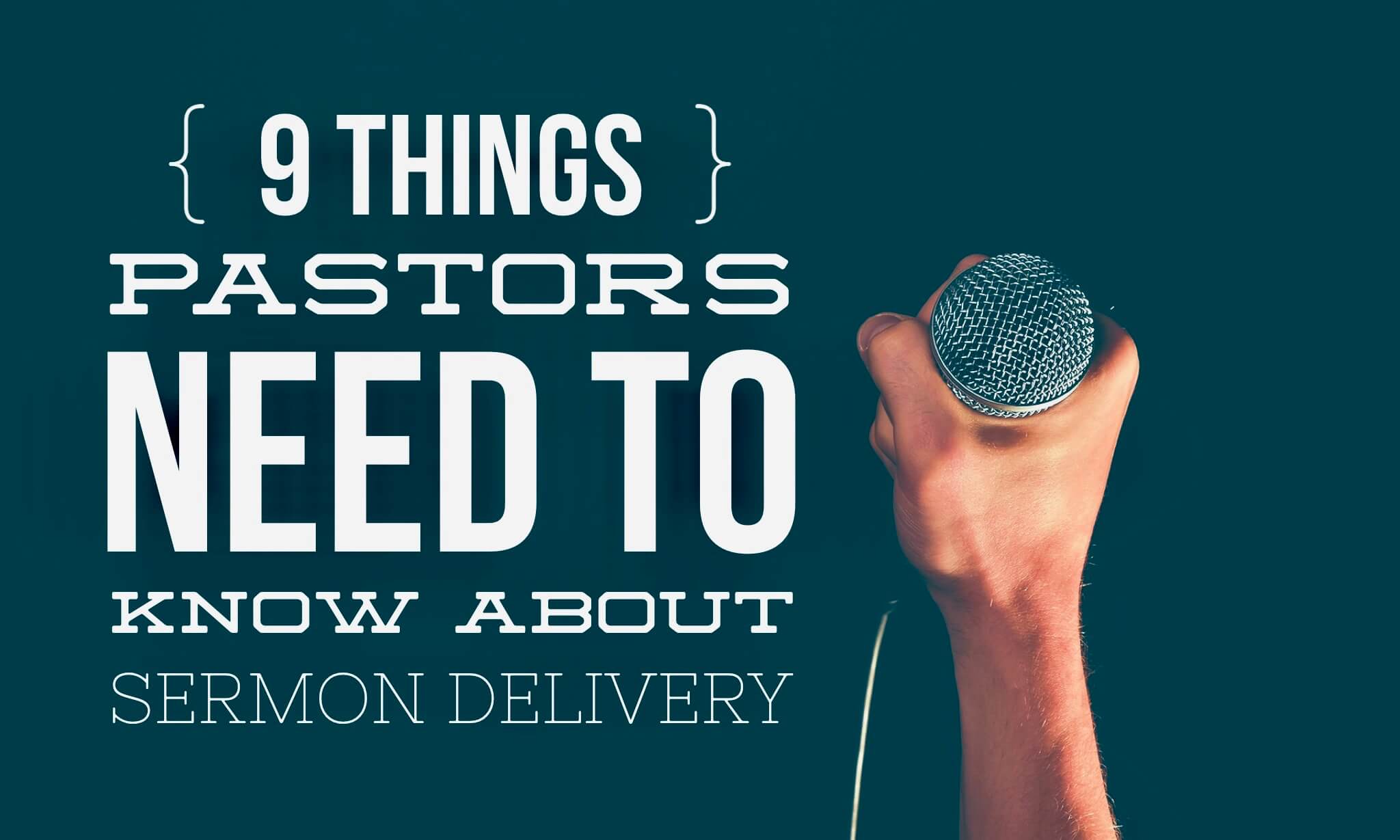9 Things Pastors Need to Know About Sermon Delivery

Effective preaching is more than just about what you say. It’s also about how you say it.
Too many sermons fail not because of bad content, but because of bad delivery.
No matter how experienced you are, you should never stop learning. You should always be a student of sermon delivery because there is always room to improve.
So here are nine tips from my book Preach and Deliver, that every pastor needs to know.
1. Start Fast
The first words from your mouth should be powerful. They should compel your audience to want to hear more.
What are you talking about? Why should I care? How does this impact me? These are questions people in the audience want to know.
People in the audience are only going to give you a minute to decide whether they want to listen or think about all the other things they have to do.
Instead of sliding into your sermon, you need to start with a bang— like a bullet from a gun.
2. Be the Same on Stage and Off
The moment you step on that platform, your life is in the public eye. People will judge you on everything you say and do. You need to be the same person on stage and off.
Far too many pastors fall because their private life doesn’t line up with their preaching life.
Authentic preachers stand on the stage, rip open their chest, and reveal their heart to the congregation. Everything they say and do comes from deep within them. It’s not an act. It’s who they are deep inside, even when nobody’s watching.
3. Look People In The Eye
Your eyes are a powerful tool. When you look at people, they look at you. It makes the message personal. You aren’t just speaking into the abyss; you are speaking to them.
When you look at everyone, you connect with no one. But when you focus on one, you connect with everyone.
Eye contact signals engagement, confidence, and trust. Trustworthy people look you in the eyes. Liars look away.
4. Vary Your Pace and Tone
Variety grips our interest. Sameness, like the sound of a babbling brook, lulls us to sleep.
Don’t be afraid to raise your voice for excitement, make sound effects when telling a story, whisper in a tender moment, or stand in silence for a few seconds.
Moving your voice, like moving your body, captures attention.
People need space to think, and variety to keep their attention. A great message wrapped in a monotone voice is a tragedy.
5. Speak Simply
Don’t make people feel like they need a dictionary or a seminary degree to understand what you are talking about.
Speak simply.
Use the common language of your audience, so the good news will be clear for all to hear.
6. Invite Engagement
If you want engagement, you need to ask for it.
If you want people to be more engaged, it starts with preaching great sermons. But after that, you have to give people permission to interact with your message and encourage them to do it.
Ask questions. Encourage a response. Ask people to stand, sit, raise their hands, or make a noise. Use pictures, videos, and illustrations. Crack a few jokes. Tell stories.
Allow people use more than their ears in your sermon, but also their eyes, hearts, hands, and imaginations.
7. Show, Don’t Tell
Don’t just tell me what to do. Show me.
- Don’t just tell me to be a better father, use an illustration to show me how.
- Don’t just tell me to read my Bible, teach me how to do it.
- Don’t just tell me to pray more, tell a story to inspire me to action.
Your application should be more than just a statement telling people what to do. Take it a step further and give examples.
8. Argue With Yourself
After you make a point, argue with yourself. Ask yourself a question that some people in the audience are probably thinking.
- “Come on. You don’t really believe that. Do you?”
- “That’s impossible!”
- “But what about…?”
Object to controversial elements in your sermon before skeptical people do. Then, you can give a thoughtful response to their objections.
9. Finish Strong
There are two common reasons that conclusions get weak: the preacher ran out of time and had to end abruptly, or they were lazy and didn’t work to write a strong conclusion, so they keep talking in circles until finally coming to a halt.
The best conclusions are neither abrupt or lazy, but deliberate. They summarize the main point and drive it home.
Like a hammer to a nail, you need to hit the central point until you drive it into the mind of your audience.
Summarize your sermon, cast a vision for a desirable future, challenge the audience to take action, and end with a memorable closing statement.
Improve Your Sermon Delivery Today
These nine tips are from my book Preach and Deliver: Captivate Your Audience, Kill Bad Habits, and Master the Art of Sermon Delivery.
And this is just the tip of the iceberg. The book includes all of this, and so much more.
It’s available now in digital, physical, or audio form. Invest in yourself and grab a copy today.
Your audience will be glad you did!




Thank you pastor, I’m a pastor in Indonesia and the tips are so helpful for my church to know the Bible and apply the Words in this present age.
Thank you sir for the tips and their explanation, I feel more informed and Improved. Hopefully, my next sermon is going to flow seamlessly.
Thank you pastor, I’m a pastor in Indonesia and the tips are so helpful for my church to know the Bible and apply the Words in this present age.
During my first ever sermon when I was about 21/22 yrs old, in a London Mission chapel, two old ladies sitting right at the front were whispering in audible voices. I was on a raised pulpit and clearly heard one of them say, in a cockney accent, “He’ll ‘ave to speak louder than that”. Needless to say the lesson was promptly heeded, and has been for over 60 yrs. I used, also, to worry that using illustrations from my own life was like boasting, but comments from my congregation members eventually persuaded me that these were legitimate use of my experiences in Christ.
Thanks for helping me on how to deliver my sermon and may the ALMIGHTY bless you for that.
Thanks for helping me on how to deliver my sermon and may the ALMIGHTY bless you for that.
Thank you! Very helpful and adaptable.
Thanks for the information,I think it will really help me to improve my standards level.
Great information for us pastors.
Very helpful
Thank you for those tips. I preach my very 1st sermon this Sunday & will use them. It solidified my speech & now I feel more comfortable & I know God will use me mightily. Thank you MIT Pam
Thanks for this tips. I seriously, I find them useful.
But can you guide me on how to get the soft copy of this book?
Thanks a lot sir, it really helped me.
You’re welcome. So glad it helped!
Good info thanks
I have done 4 sermons now in my church. I needed to improve on my delivery. Thank you so much.
Thank you, Terry. So glad this was helpful for you. Keep up the good work!
The 9 point on sermon delivery are awesome